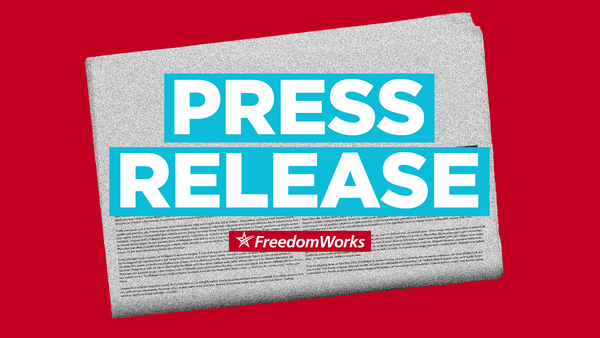Key Votes Related to FISA Bills on the House Floor

On behalf of our activist community, I urge you to contact your representative and ask him or her to vote YES on the Protect Liberty and End Warrantless Surveillance Act, H.R. 6570, and to vote NO on the FISA Reform and Reauthorization Act, H.R. 6611. For purposes of FreedomWorks’ Scorecard, these votes will be double-weighted to highlight the importance of this issue.
The House Judiciary Committee’s Protect Liberty and End Warrantless Surveillance Act and the House Permanent Select Committee on Intelligence’s FISA Reform and Reauthorization Act are expected to come to the floor under a process known as “Queen of the Hill.” The bill or amendment that has the most votes wins. While it is encouraging to see Speaker Johnson allow these two bills to come to the floor to pass or fail on their own merit, his inclusion of a temporary extension in the NDAA only kicks the proverbial “can” down the road in typical D.C. fashion.
One of the two bills being brought to the floor actually reforms the Foreign Intelligence Surveillance Act (FISA) and protects Americans’ privacy. That bill is the bipartisan House Judiciary Committee’s Protect Liberty and End Warrantless Surveillance Act (PLEWSA), H.R. 6570. The House Judiciary Committee approved the bill on December 6 by a 35 to 2 vote. This bill aims to ensure that a warrant is required for all U.S. person searches, subject to reasonable, narrowly-tailored exceptions, such as where there is an imminent threat of death or serious bodily harm, where the U.S. person gives their consent, or to search for malicious computer code. PLEWSA’s warrant requirement — unlike the illusory protections in the FISA Reform and Reauthorization Act — would end unchecked warrantless backdoor searches. As Judiciary Committee Chairman Jim Jordan rightfully points out, it shouldn’t be controversial to prevent the FBI from spying on Americans without a warrant.
PLEWSA would bring major reforms to FISA and reauthorize Title VII. Among the bill’s other key reforms are limitations on the number of FBI employees who may conduct searches of U.S. persons, the repeal of “abouts” collection, and expanded involvement by amici curiae in the FISA Court process. Violations of privacy protections, knowingly making false material declarations or material omissions in documents submitted to or statements made before the Foreign Intelligence Surveillance Court (FISC), and intentionally disclosing a FISA application or classified information contained in the application to any person not entitled to receive such information would be punishable by imprisonment for a maximum of eight years and/or a $10,000 fine.
Further, PLEWSA includes the bipartisan Fourth Amendment Is Not For Sale Act that seeks to close the Data Broker Loophole — which the federal government exploits to circumvent the Fourth Amendment by purchasing Americans’ data from data brokers — for location and other sensitive data. Making sure that this sensitive information can’t be purchased by the federal government just because you decided to browse the internet is another reform that should not be controversial. These commonsense provisions all run contrary to the House Permanent Select Committee on Intelligence (HPSCI) and the intelligence community’s so-called FISA “Reform” and Reauthorization Act. As we’ve seen in the past, we cannot count on the FBI to hold themselves accountable.
The reforms mentioned here only scratch the surface of those included in the PLEWSA. This is a generational bill that shakes up the status quo in the intelligence community, which is why the HPSCI and the intelligence community oppose PLEWSA and are spreading either misleading narratives or outright lies about the bill as they push their own legislation that does absolutely nothing to prevent the worst abuses of FISA and would actually “significantly expand” warrantless surveillance.
The HPSCI is a wholly owned subsidiary of the intelligence community. The so-called reforms in the FISA Reform and Reauthorization Act merely codify existing policies and practices and would do nothing to prevent the worst abuses of FISA. As we noted in our key vote against NDAA, FISA has been used to wrongfully spy on donors to a congressional campaign, individuals engaged in lawful First Amendment activities, journalists, and members of Congress without a warrant. The Federal Bureau of Investigation (FBI) conducts more than 200,000 queries of U.S. Persons annually. Between December 2021 and November 2022, only 16 of these queries were “Evidence of a Crime-Only” queries in which information collected under Section 702 was returned.
Although the HPSCI bill prohibits searches of Section 702 information “whose purpose is either (1) to suppress or burden criticism, dissent, or the free expression of ideas or political opinions by such U.S. person, or (2) to disadvantage such U.S. person based on their ethnicity, race, gender, sexual orientation, or religion,” we struggle to understand how this is fundamentally different from the constitutional protections that already exist. Moreover, these restrictions exist in policy, but that hasn’t stopped the FBI from conducting such searches. These agencies need an independent check.
While the HPSCI bill would continue the worst abuses of FISA, members of Congress would be given a carve-out. The FBI would be required to get the consent of the member on whom it would conduct a search of Section 702 information. No other American would be afforded such a right, making this yet another example of Congress not living by the same rules it imposes on everyone else.
Another provision of the HPSCI bill, found in Section 504, is also alarming. This section expands the definition of an “electronic communications service provider” to include “equipment that is being or may be used to transmit or store such communications” and would include “custodians and employees” in the scope of surveillance. This means that any business or establishment (hotels, libraries, with a WiFi router in which one-sided foreign communications can be found would be included in the scope of surveillance. This is a dramatic expansion of warrantless surveillance.
The HPSCI bill would also reauthorize FISA for eight years. The goal of the intelligence committees in Congress and the intelligence community is to make FISA permanent. An eight-year reauthorization is two years longer than the FISA Amendments Reauthorization Act of 2017. This longer reauthorization is a mission creep that we cannot accept.
We will celebrate members who vote for the Protect Liberty and End Warrantless Surveillance Act. For those who vote for the HPSCI bill, the so-called “FISA Reform” and Reauthorization Act, we will make sure your constituents know that you placed your privacy above theirs and gave the intelligence community nearly everything it wants over their constitutionally protected rights. FreedomWorks will count the vote on the Protect Liberty and End Warrantless Surveillance Act, H.R. 6570, and the FISA Reform and Reauthorization Act, H.R. 6611, when calculating our Scorecard for 2023. These votes will be double-weighted.
*************
FreedomWorks will count this vote on our 2023 Congressional Scorecard and reserves the right to score any amendments, motions, or other related votes. The scorecard is used to determine eligibility for the FreedomFighter Award, which recognizes Members of the House and Senate who consistently vote to support economic freedom and individual liberty.


